Diplomatic Bluebook 2018
Chapter 4
Japan's Diplomacy Open to the Public
2 Japanese Taking Active Roles in the International Community
(1) Japanese Taking Active Roles in International Organizations
International organizations are founded to serve the common interest of the international community. People of various nationalities join these international organizations and draw on their skills and traits to create an environment where people of the world can live in peace and enjoy prosperity. There are many international organizations working to solve global issues that cannot be addressed by individual countries; for instance, conflict prevention/peace-building, sustainable development, food, energy, climate change, health, education, employment, human rights/humanitarian issues, and gender equality, among others.
Talented individuals with specialized knowledge, passion and capabilities to contribute to the world's interests are needed so that international organizations can competently perform their duties and fulfill the roles expected of them. In order for each international organization to pursue its agenda, in addition to policy contributions and financial contributions through regular budget and voluntary contributions, Japan also makes contributions in terms of human resources through the active roles of Japanese staff.
Currently, about 800 Japanese nationals are working as professional level staff in UN-related agencies around the world. The number of Japanese employees continues to increase, signifying the expansion of Japan's personnel contributions. However, taking into account the number of professional level staff of other G7 member countries, which exceed 1,000, Japanese personnel contribution remains insufficient.
The Government of Japan has set the objective of increasing the number of Japanese staff working at UN-related agencies to 1,000 by 2025. To this end, MOFA is actively recruiting, training and supporting, in collaboration with universities and related ministries and agencies, Japanese nationals who can play active roles and make a contribution on the global stage. As part of this effort, to identify talent, MOFA works on PR initiatives, including organizing guidance sessions to provide information on the process of recruitment by international organizations and hosting Outreach Missions of human resource staff from international organizations visiting Japan.
Furthermore, MOFA seeks to develop young people dispatched to international organizations by strengthening and expanding the Junior Professional Officer Programme (a system of sending young Japanese nationals who aspire to work in international organizations as regular staff for two years in principle to provide them with opportunities to gain necessary knowledge and experience in international organizations and to aim for regular employment after their dispatch). MOFA is also working to coordinate with international organizations and gather information for the promotion and employment of Japanese staff, including those at the mid-career and managerial level.
MOFA is also committed to supporting for the application process, providing useful information including vacancy information and using its website and social networking services such as Facebook and Twitter to Japanese candidates seeking positions at international organizations.
A larger number of talented Japanese people taking on active roles in international organizations are expected to further enhance Japan's presence in the international community more visibly. Japanese staff are involved in various fields and duties at differing locations, but they share the same goal of solving various issues facing the international community (see Column “The Voices and People Who Have Supported the United Nations” and “Japanese Working on a Global Scale”).
In addition, Japanese staff of international organizations may play the role of a “bridge” between the international organization and their home country. For example, Japan's successful co-hosting of the UHC Forum 2017 with the World Bank, World Health Organization (WHO), and United Nations Children's Fund (UNICEF) and others was underpinned by the important role played by Japanese staff members, who understand the stance and work procedures of both Japan and partner organizations. In this manner, the presence of Japanese staff in international organizations has vital significance also from the perspective of promotion of Japan's diplomatic priorities.

Moreover, increasing the number of globally-minded human resources who have professional experience at international organizations and can play an active role on the international stage will in turn lead to enrichment of human resources of Japan, contributing to the development of Japan as a whole.
MOFA will continue to be even more active in undertaking measures to increase the number of Japanese nationals working in international organizations so that a larger number of competent Japanese nationals who have high aspirations and passion to contribute to solving global issues can take part in international organizations.
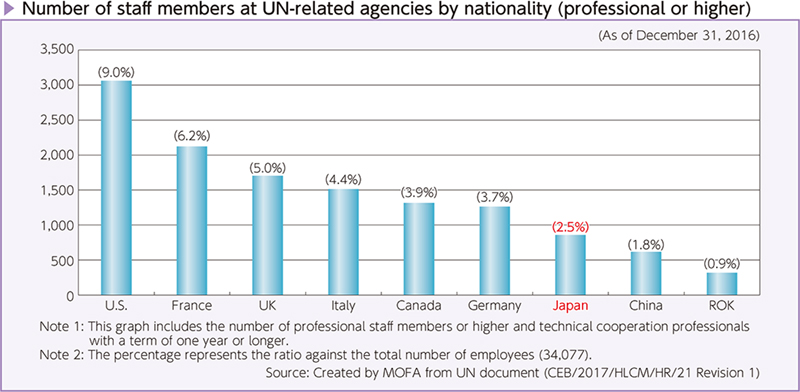
Norimasa Shimomura, UN Resident Coordinator and UNDP
Resident Representative in Kazakhstan
What is a UN Resident Coordinator? How can you become one? These are questions I receive frequently these days. UN Resident Coordinator (RC) is entrusted by the UN Secretary-General to provide leadership over the operational activities carried out by various UN agencies on the ground. The RC is expected to speak in single voice for the UN and maximize the impact of UN's work by effectively coordinating them. Usually, UNDP Resident Representative takes on this function, and they are conferred in many countries a similar status as Ambassadors of foreign states. Often the RC also plays central role in coordinating donor assistance provided to the host country. Aside from the important routine work related to development cooperation, the RC attentively follows political and economic developments in and out of the country, and encourages the host country to promote human rights and other international standards and agreements. The RC is usually the UN's Designated Official (DO), responsible for the safety and security of all UN personnel and their families in the country. As such, the RC/DO reports at least to three Under-Secretary-Generals who are in charge of development activities, humanitarian affairs and staff safety.
In Kazakhstan where I serve, we have 21 UN agencies present in the country. I coordinate their activities through such mechanisms as monthly coordination meetings. When it comes to the issues of staff safety and security, 28 agencies with 500 staff and their families fall under my overall responsibility as agencies like the World Bank, Asian Development Bank and EBRD also come under UN's security management system. Given this broad responsibility, people often jokingly say that RC is almost an impossible job. Despite the vast scope of responsibility, the RC has very limited authorities over UN agencies. This is a part of RC system's structural weakness that is being discussed actively by the Secretary-General and Member States in the context of the ongoing UN reform. Nonetheless, RC – with his/her caliber – can exercise strong influence on issues like SDGs and human rights. I often find it so rewarding to see tangible results at the community level while being able to influence and promote policy reforms by engaging in policy dialogue with high-level decision makers in the Government. This enables us to help replicate and scale-up community-level successes at a national scale. It gives us a great sense of satisfaction when we are able to mobilize the members of diplomatic corps including Japan, civil society, academia and the private sector to collaborate in such efforts.
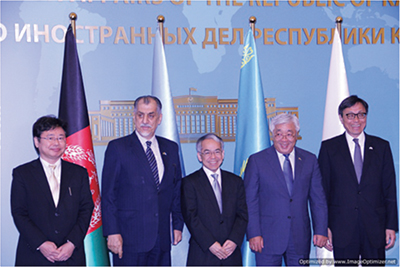 Signing ceremony for the project to support the development of an assistance system in Kazakhstan, which was implemented through a contribution from the Japan-UNDP Partnership Fund (August 2016, Ministry of Foreign Affairs of Kazakhstan)
Signing ceremony for the project to support the development of an assistance system in Kazakhstan, which was implemented through a contribution from the Japan-UNDP Partnership Fund (August 2016, Ministry of Foreign Affairs of Kazakhstan)From the left: Toshinobu Kato, Director General, East and Central Asia and the Caucasus Department, JICA; Mohammad Farooq Baraki, Ambassador of Afghanistan to Kazakhstan; the author; Erlan Idrissov, Minister of Foreign Affairs of Kazakhstan; and Ichiro Kawabata, Ambassador of Japan to Kazakhstan
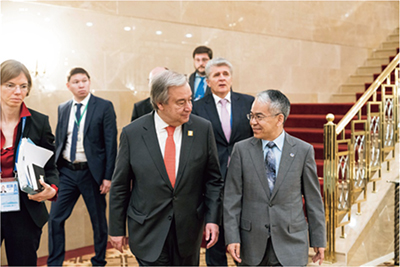 With the UN Secretary-General Guterres, during his visit to Kazakhstan (June, Kazakhstan)
With the UN Secretary-General Guterres, during his visit to Kazakhstan (June, Kazakhstan)So then, how can one become a UN Resident Coordinator (RC)? Although it is the UNDP Resident Representative who usually becomes the RC in a given country, one does not necessarily have to build a career in the UNDP. The positions of UNDP Resident Representative is open for staff from other UN agencies – In fact about 45% of all UNDP Resident Representative positions globally are currently occupied by such seconded staff of other agencies. They often say you need to be highly skilled on technical issues. This may be true. But I have always believed that passion is what matters most. As RC, you will indeed have to be versed with matters such as human rights and rights of vulnerable persons including women and children, democratic governance and public administration reform, energy sector transformation, prevention of radicalization and violent extremism. Certain things are more important than mere technical expertise on each of these subject matters. They are the ability to comprehend sensitive backgrounds of various matters often linked with political and security issues, ability to make sound judgment without diverging from the spirit of the UN Charter, ability to make timely decisions while taking calculated risks, and the ability to mobilize human, financial and other resources to make things happen. These I believe are key competencies required to become an RC.
Still to date, I agonize every day if for every challenge I face I have taken the right decision and action. Perhaps it is important that I continue to be humble and ask myself this question, while I continue to appreciate the rewarding aspects of this work including the many smiles in people's face we create as a result of tangible outcomes we deliver.
Ayaka Suzuki, Director, Strategic Planning & Monitoring, Office of the Secretary-General
It's a tired phrase but the world seems to be at a crossroad. The number of conflicts has increased in the recent years and the world is confronted with nuclear and terrorist threats, climate change, as well as “emerging” threats from cyberspace and new technologies such as artificial intelligence. Of course, new technologies also offer a great opportunity to advance sustainable development. Our future largely depends on the direction these developments will take us.
We face the world in which inequality between States and within States is increasing. After 72 years, the UN faces an increasingly complex world and there are fundamental questions about how best to fulfill its mandate under the United Nations Charter. Convinced that the UN is needed more than ever in these circumstances, Secretary-General Guterres has been steadfastly trying to advance comprehensive reforms since he assumed office in January 2017. During the 2017 General Assembly, he said the following:
“We need to reform our world, and I am committed to reforming the United Nations.
Together, we have embarked on a comprehensive reform effort:
- to build a UN development system to support States in bettering peoples' lives;
- to reinforce our ability to safeguard people's peace, security and human rights;
- and to embrace management practices that advance those goals instead of hindering them.”
I was serving as joint Chief of Staff of the Departments of Peacekeeping Operations and Field Support when I was appointed in April 2017 as Director of Strategic Planning and Monitoring in the office of the Secretary-General, which is a newly created position. Since the early 1990s, I have been working to advance democracy as well as peacekeeping and political affairs both in the field and at headquarters. I hope that my past experience will help contribute to the Secretary-General's reform vision. Until now, I had been primarily focused on peace and security issues, in particular conflict resolution, but in the current position, I am working across all the pillars of the UN (peace & security, human rights, sustainable development), which I find to be refreshing. In particular, I'm learning a lot about Agenda 2030 and new technologies/innovation issues.
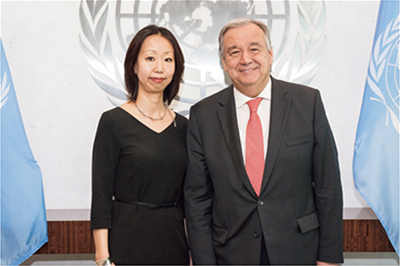 With the UN Secretary-General Guterres
With the UN Secretary-General Guterres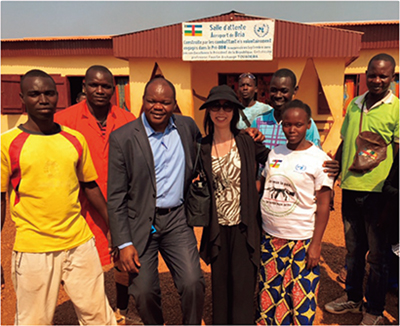 With project staff from the Disarmament, Demobilization, Reintegration (DDR) component of the UN Stabilization Mission in the Central African Republic (MINUSCA) program and ex-combatants in Bria, Central African Republic (the author is in the center)
With project staff from the Disarmament, Demobilization, Reintegration (DDR) component of the UN Stabilization Mission in the Central African Republic (MINUSCA) program and ex-combatants in Bria, Central African Republic (the author is in the center)Among my current responsibilities is to serve the Executive Committee of the Secretary-General, which is a cabinet-style decision-making forum established by Secretary-General Guterres, which takes place on a weekly basis. Preparation of briefing notes and follow-ups to meetings keep us very busy but it is very impressive to witness the political skills of the Secretary-General as the Chair of this meeting, his principled approach as a humanitarian, organized way of thinking as an engineer and his in-depth knowledge and understanding of the world. At the same time, the UN being a complex organization with various intertwined agendas of Member States, the road for the reform is expected to be a long one. Moreover, it is a constant challenge to balance the daily management of mounting crises with the need to pursue mid to longer-term strategies.
In my current position, I have an overview of not only the Secretariat but the UN system at large. What I miss is a direct link to the work in the field. Throughout my career, the positions where I felt the most direct impact of my involvement were often in the field in places such as Africa, Haiti and Latin America. I would like to go back to the field again for future postings but for now, I find my current assignment to be very fulfilling, given the critical juncture where we find ourselves.
Masanori Kondo, Deputy Secretary General, Asia-Pacific Telecommunity (APT)
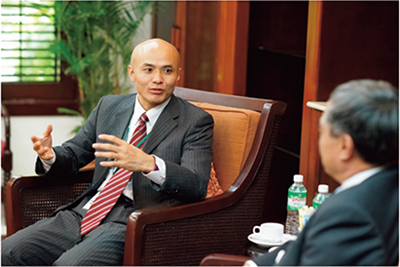 The author interviewing Viet Nam's Deputy Minister of Information and Communications Nguyen Minh Hong
The author interviewing Viet Nam's Deputy Minister of Information and Communications Nguyen Minh HongThe inside and outside of international organizations. When I look back at my experiences of being involved in work at international organizations up to now from a perspective like that, there are three different standpoints: a member state (meaning a member that participates in discussions), activities in the field, and working within a secretariat.
The first point is my experience from the standpoint of a member state who participates as a member state in discussions and negotiations on issues requiring international coordination and cooperation in the fields of information and communications technology as well as postal services, which fall under the jurisdiction of the Ministry of Internal Affairs and Communications, and who sought to find a consensus of opinion through those discussions and negotiations. Organizations in these fields include the International Telecommunication Union (ITU) and the Universal Postal Union (UPU). They determine the rules governing the processing of information that circulates internationally (through the use of the Internet and mobile phones, for example), and delivery methods, fee payments and other matters relating to international mail and parcels. Each of these is essential to economic activity, and frequently the respective countries' interests are sharply divided. Particularly, in the Internet-related field, there are pronounced differences in the attitudes and approaches taken to future socioeconomic development, and negotiations often take place from early morning till late at night including weekends. The international organizations that I saw from this standpoint were places for discussions and negotiations aimed at reaching a consensus, and they are valuable entities that provide “platform” for achieving that.
The second point is my experience of being in charge for the United Nations Relief and Works Agency for Palestine Refugees (UNRWA) when I was at the Embassy of Japan in Jordan. Rather than being a place that directly decides policies and rules as an international organization, UNRWA is classified as an implementing organization that implements necessary projects and provides necessary services to beneficiaries. It is “field site,” so to speak. At that time Japan was one of the UNRWA's largest donor countries, and it has been performing a very major role in achieving peace in the Middle East. Consequently, if a Japan-U.S. Summit Meeting is held, for example, the details of Japan's support for UNRWA and Palestine refugees will also be one of the items on the agenda. My experiences here, which included actually traveling to refugee camps in Gaza, the West Bank, Lebanon, Syria and Jordan and listening carefully to the needs of those people, including their troubles, worries and complaints, taught me many lessons. It had been always a difficult decision to make which projects should be listed up considering priority and allocated budget. At international organizations that work in the field, there is a sense of fulfillment in achieving concrete projects and rejoicing together.
The third point is my current position, which is within an international organization's secretariat. Asia-Pacific Telecommunity (APT) is an organization that 38 countries in the Asia-Pacific region belong to (its membership also includes information and communications companies such as Google and Facebook, as well as NTT Docomo, KDDI and others in Japan), and as a specialized organization in the information and communications field, it undertakes the allocation of frequencies (if these were not coordinated, it would become impossible to use smartphones and Wi-Fi in other countries), implements Internet infrastructure development projects and so on. APT has two sides – a policy-related side and an in-the-field side. Appointment to the post of Deputy Secretary General is based on an election by the member states (international organizations' elections also have many interesting points). Because Information Communications Technology (ICT) is currently used in all fields, the APT's work as an organization continues to increase. From the perspective of an international organization's secretariat, Japan is just one of members, therefore it is possible to observe its sensitivity to information or an event of some sort when they come up. It is also possible to compare how Japan and other countries communicate and coordinate with the secretariat, and furthermore, to observe changes to its presence in the so-called international community. The Asia-Pacific region is rich in diversity and so does APT. The member states, Associate Members (private companies) and secretariat staff are very diverse. So in many cases things do not go as I think they will, but that is a fundamental resource to give me lessons to learn.
In this way, the fact is that things can be seen in different ways from different standpoints. But in working within the secretariat of an international organization, the ability to be flexible and accept a different perspective or to question your own "common sense" is essential in one's day-to-day work. I certainly recommend that individuals who have a multifaceted way of thinking, and individuals who want to develop one, try working at an international organization. I am sure they will enjoy it and accomplish their goal.
Yushi Torigoe, Deputy to the Director, Telecommunication Development Bureau (BDT),
International Telecommunication Union (ITU)
 At a meeting of the ITU
At a meeting of the ITUAt the recommendation of the Ministry of Internal Affairs and Communications, where I worked for around 24 years, I applied for a public recruitment post and was appointed in 2014. This is the third time I have worked at an international organization. I have previous experiences working for a regional organization in Bangkok, and an international organization in Geneva. The ITU is the United Nations (UN) specialized agency for telecommunication and information and communication technologies (ICTs). It was founded in 1865 and celebrated its 150th anniversary in 2015, so it is an agency that boasts a long history even within the UN.
The ITU consists of the Radiocommunication Sector (ITU-R), the Telecommunication Standardization Sector (ITU-T) and the Telecommunication Development Sector (ITU-D). It (1) decides the international usage of radio spectrum and satellite orbits; (2) develops technical standards for information and communication networks; and (3) provides support for developing countries in relation to telecommunication and ICTs.
The ITU-D, which I belong to, was set up in 1992 and celebrates its 25th anniversary this year, making it a relatively new sector within the ITU. The secretariat is made up of the headquarters in Geneva and field offices in six regions worldwide.
In October the World Telecommunication Development Conference (WTDC-17) was held in Buenos Aires (Argentina). The WTDC is a conference that is held once every four years to deliberate and formulate the future direction of the ITU-D's activities. Preparations for this conference started three years ago. As the overall coordinator, I was in charge of the overall coordination.
As part of the preparation, from fall 2016, the ITU-D held regional preparatory meetings in six regions worldwide, where it put the preliminary draft action plan up for discussion.
I too participated in four of the regional meetings, and was surprised that the deliberations were proceeded very actively not only in English but in the common languages of each region (Russian in the Commonwealth of Independent States (CIS) region, Arabic in the Arab region, and Spanish in the Americas region). As a result of the deliberations at the regional meetings, it was possible to consolidate the regional views, and at the WTDC-17 the number of proposals from members was around 30% higher than the previous conference.
To facilitate smooth entries to Argentina, where the WTDC-17 was hosted, the schedule was moved forward and a campaign was run to encourage participants to register for the conference and obtain visas early. As a result, the conference attracted more than 1,360 participants, a record for a WTDC thus far.
These preparations proved successful, and made it possible to close the conference with the successful adoption of the action plan that better reflected the views of each country.
Japan also dispatched a large number of participants and made great contributions, along with an exhibit that showcased its leading-edge technologies.
In recent years the spread and development of ICTs has been remarkable, and the utilization of smartphones and high-speed Internet has become indispensable in business and everyday life. Initiatives aiming to utilize ICTs to enhance productivity at the national level and to create new industries are gaining momentum in various countries, and the expectations being placed on the ITU, as the UN specialized agency for ICTs, are also increasing. Collaboration with other UN agencies is also progressing, and in partnership with the World Health Organization (WHO), the ITU is promoting the use of mobile handsets for the better health in countries worldwide.
Additionally, Japan enjoys a strong reputation globally for leading the world in the development of advanced ICTs. Alongside the U.S., Japan is the largest contributor of funding at the ITU, and it is also making major contributions on the human resources and activities fronts.
Going forward, I want to endeavor to ensure that Japan's new technologies are introduced to the world through the ITU, and that the benefits of those technologies are utilized worldwide. I hope that the ITU will continue to be put to good use.
(2) Activities of Non-Governmental Organizations (NGOs)
A Development Cooperation
It is estimated that in Japan there are over 400 non-governmental organizations (NGOs) engaged in international cooperation activities. Most of them are familiar with local needs at the grassroots level and provide flexible and detailed support in developing countries/regions with various challenges such as poverty, natural disaster, and conflicts and their importance in development cooperation is increasing.
MOFA provides financial cooperation in the form of grant assistance for economic and social development projects implemented by Japanese NGOs in developing countries/regions (Grant Assistance for Japanese NGO Projects) and actively provides Official Development Assistance (ODA) through NGOs. In 2017, 58 Japanese NGOs implemented 113 Grant Assistance for Japanese NGO Projects in 34 countries in Asia, Africa, the Middle East, etc. The projects cover a wide range of assistance, including health/ medical/hygienic care (maternal and child health, countermeasures for tuberculosis/ HIV/AIDS, water/hygiene, etc.), rural development (environmental development/ technological improvement for agriculture), support for the people with disabilities (vocational training/employment assistance, provision of wheelchairs for children, etc.), education (building schools, etc.), disaster risk reduction, and the clearance of landmines and unexploded ordnances (UXO). Moreover, subsidies are provided with the objective of supporting activities that enhance the project execution capabilities and expert skills of Japanese NGOs and promote NGO projects (NGO Project Subsidies).
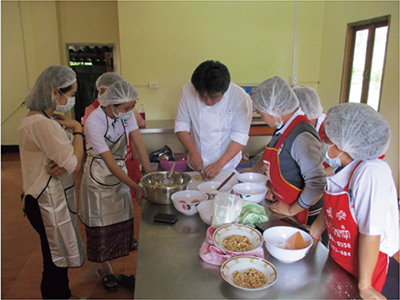 Job Creation Project for Persons with Disabilities in Houaphanh Province, Laos (Grant Assistance for Japanese NGO Projects Photo: Asian Development with Disabled Persons (ADDP; specified non-profit organization)
Job Creation Project for Persons with Disabilities in Houaphanh Province, Laos (Grant Assistance for Japanese NGO Projects Photo: Asian Development with Disabled Persons (ADDP; specified non-profit organization)The Japan Platform (JPF) was established in 2000, with the aim of conducting emergency humanitarian assistance more effectively and promptly through cooperation and partnerships among the Government, NGOs and business communities at the time of large-scale natural disasters or conflicts. As of the end of December 2017, 47 NGOs are members of JPF. In 2017, JPF launched response programs to South Asia and Sierra Leone floods and for people fleeing Myanmar, while continuously implementing response programs for the Syria and Iraq humanitarian crisis. Humanitarian assistance was also provided to Afghanistan, Yemen, Palestine, and South Sudan, etc.
Japanese NGOs conduct a number of activities using contributions from supporters and the income earned from their own business. In recent years, there is growing public interest in Corporate Social Responsibility (CSR) and Creating Shared Value (CSV), an increasing number of companies with technologies and funds implement social action in developing countries in partnership with NGOs with much knowledge on development cooperation.
As seen thus far, NGOs assume important roles in the area of development cooperation. Identifying such NGOs as partners in development cooperation, MOFA and JICA provide indirect support for NGO activities through various policy measures with the aim of enhancing their capacity, and expertise as well as developing human resources so that NGOs can strengthen the foundation for their activities and perform further tasks. In 2017, MOFA implemented four projects, namely “NGO Consultant Scheme,” “NGO Overseas Study Program,” “NGO Intern Program” and “NGO Study Group.”
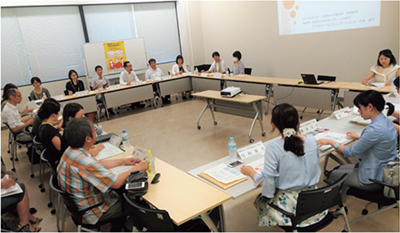 The 1st NGO Consultants Liaison Meeting of FY 2017 (June 23, Tokyo)
The 1st NGO Consultants Liaison Meeting of FY 2017 (June 23, Tokyo)Moreover, the general meeting of the “NGO-MOFA Regular Consultation Meeting” was held to promote dialogue/coordination with NGOs. Also the ODA Policy Council to discuss ODA policy and the Partnership Promotion Committee to discuss support for NGOs and cooperation measures was held, too. In addition, MOFA has been working on initiatives to achieve the Sustainable Development Goals (SDGs) while conducting exchanges of views with various stakeholders, including NGOs, through the “SDGs Promotion Roundtable” and other means.
B Partnership in Other Major Diplomatic Areas
MOFA also cooperates with NGOs in areas other than development cooperation. For instance, at the 61st session of the UN Commission on the Status of Women (CSW) held in March 2017, Ms. Hiroko Hashimoto (professor emeritus of Jumonji University and principal of Jumonji Junior/Senior High School) represented Japan, and NGO representatives actively participated in discussions as members of the Japanese delegation. At the 72nd UN General Assembly, Ms. Yasue Nunoshiba (professor of Bunkyo University) attended the Third Committee, which deals with a range of social and human rights issues, as an advisor to the representatives of the Government of Japan. In addition, the Government of Japan has initiated dialogues with civil society including NGO representatives and experts on matters related to government reports to be submitted based on various conventions on human rights, third country resettlement projects, and the National Action Plan on Women, Peace and Security based on the UN Security Council (UNSC) Resolution 1325 and related resolutions.
Japanese NGOs are also increasing their presence in the area of disarmament, and MOFA has been actively promoting cooperation with them. For example, in the area of conventional weapons, cooperation such as participation of MOFA officials in seminars hosted by NGOs, clearance of mines and unexploded ordnances, and risk reduction education projects are going on.
Furthermore, in the area of nuclear disarmament, MOFA has been conducting dialogues with various NGOs and experts. The Government supports the activities of NGOs and others to convey atomic bomb survivors' testimonies on the realities of the disaster of the use of nuclear weapons to the international community through the commissioned projects called “the Special Communicator for a World without Nuclear Weapons” and “the Youth Communicator for a World without Nuclear Weapons.” As of December, a total of 281 Special Communicators on 91 occasions and a total of 246 Youth Communicators on 23 occasions have been dispatched to the world through these commission programs.
As for the measures against transnational organized crime, especially in the area of trafficking in persons, coordination with civil society including NGOs is essential. With this in mind, the Government actively exchanges opinions with NGOs and other stakeholders to identify recent trends of trafficking in persons and to consult appropriate measures to tackle them.
(3) Japan Overseas Cooperation Volunteers (JOCV) and Senior Volunteers (SV)
The Japan Overseas Cooperation Volunteers (JOCV) is a Japan International Cooperation Agency (JICA) program aimed at cooperation/assistance for the economic and social development of the communities of the developing countries where young people from 20 to 39 years of age, who possess skills, knowledge and experience, live and work together with local people in these countries, fostering mutual understanding. As of the end of October 2017, 43,286 JOCVs had been dispatched to 89 countries in total. Dispatched members have been engaged in about 200 types of work in ten areas: planning administration, commercial/tourism, public utility works, human resources, agriculture, forestry and fisheries, health/medical care, mining, social welfare, energy and others.
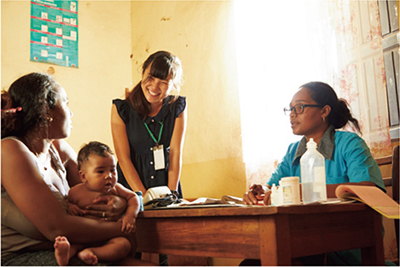 Japan Overseas Cooperation Volunteers assisting mother and child health in Madagascar as midwives (Photo: Hiroshi Wada / JICA)
Japan Overseas Cooperation Volunteers assisting mother and child health in Madagascar as midwives (Photo: Hiroshi Wada / JICA)The JOCV program, launched in 1965 and celebrated its 50th anniversary in 2015, received the Philippines' Ramon Magsaysay Award1, otherwise known as the Asian Nobel Prize. The JOCV has been highly appreciated by developing countries as representing the “Visibility of Japanese International Cooperation.”
The Senior Volunteers (SV) program is a program to dispatch middle aged persons from 40 to 69 years of age who have wide-ranging skills and rich experiences to developing countries. The program has been expanding every year since its launch in 1990. By the end of October 2017, a total of 6,271 volunteers had been dispatched to 75 countries, and cooperated in the same ten areas as the JOCV program. The SV program has drawn increasing interest in recent years from the perspective of supporting to start a new life after retirement and utilizing the rich experiences and expertise of retired senior citizens.
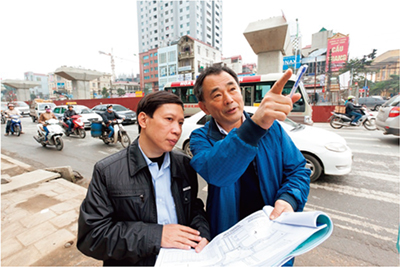 Senior Overseas Volunteers instructing transportation management techniques in Viet Nam (Photo: Yuki Kato / JICA)
Senior Overseas Volunteers instructing transportation management techniques in Viet Nam (Photo: Yuki Kato / JICA)The JOCV and SV programs are supported by the high aspirations of people who are keen to provide cooperation for the sake of economic and social development and reconstruction of developing countries. MOFA actively promotes these programs, considering them as a core of participatory international cooperation by citizens. As of the end of October 2017, 1,964 JOCVs and 355 SVs are working around the world (70 countries and 57 countries, respectively). The volunteer participants who have returned to Japan contribute to Japanese society by sharing their experiences in educational and local activity settings and private companies. These unique participatory activities of Japan have been highly appreciated and expected both domestically and internationally, including in recipient countries.
Experiences gained from the JOCV/ SV programs can lead to the personal development of the participants as human resources who will make a positive impact on the global arena. Thus, the Government has been working with companies, municipal governments and universities which need such opportunities to develop human resources through the dispatch of their employees, teachers and students to developing countries. This could lead to expansion of the participation from a broad range of areas. For instance, as a program responding to the needs of private companies, such as small and medium-sized enterprises, aiming for international development of their businesses, the Government launched the “Private Sector Partnership Volunteer” program in FY 2012. Furthermore, the Government is committed to developing an environment where returned JOCVs and SVs can feed back their experiences into society, including employment support. Returned volunteers are active in many fields inside and outside Japan. Some have been hired by the Reconstruction Agency to work as support staff for disaster-stricken local governments, utilizing their own specialties and experience gained in the JOCV/SV programs. Some keep on supporting the countries where they were dispatched with other returned volunteers, others work for international organizations.
- 1 Established to commemorate President Ramon Magsaysay of the Philippines, the Ramon Magsaysay Award is awarded each year by the Ramon Magsaysay Award Foundation located in Manila City to an individual or organization that has produced exemplary results in Asia through contributions to society, etc.
Hiroko Shimada, Volunteer Coordinator, JICA
A southern island of everlasting sun. Emerald green seas with white sandy beaches, coral reefs and palm trees.
Despite a calm and laid-back image of the Pacific, non-communicable diseases (lifestyle-related diseases, hereinafter referred to as NCDs) such as obesity, diabetes have become a serious problem in Fiji and other Pacific island countries. The main causes for NCDs are considered the custom from British colonial era of having thickly buttered bread and heavily sugared tea for morning and afternoon every day, changes in eating habits over the recent years into imported food high in oil and cholesterol, a lack of exercise and so on. NCDs account for 80% of all deaths in Fiji and the increase of NCDs-related deaths before the age of 70 is of particular concern. In addition, it has also been pointed out that the cost of tackling NCDs is putting pressure on government finances.
NCDs are lifestyle-related diseases and as preventive measures, it is important to acquire accurate knowledge on food and their bodies from childhood and to maintain healthy habits to keep fit accordingly. JICA is dispatching nutritionists as Japan Overseas Cooperation Volunteers (hereinafter referred to as JOCVs) to improve the local people's eating habit and their health. Here in this column, I would like to introduce the “School Lunchbox Program” conducted by a volunteer.
This program began in February 2016 with the aim of helping to support nutrition education at home by improving the menu of children's lunch boxes. The program covers elementary-school children (aged 6 to 13) and begins with the JOCVs and/or local nutritionists checking the content of the lunch boxes every day with the children's homeroom teachers.
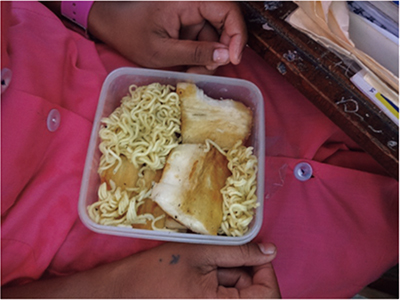 A lunch box of instant noodles and fried cassava tuber
A lunch box of instant noodles and fried cassava tuber Checking lunch boxes
Checking lunch boxesIn Fiji, rice and potato varieties such as taro and cassava are frequently eaten as staple foods. It is common to see lunch boxes that combine rice and instant noodles, or taro or cassava and chicken meat. Rarely is it possible to spot lunch boxes that include a good balance of vegetables, fruit and so on. That being the case, in this program check sheets are filled out to determine whether or not the lunches contain at least one variety of carbohydrate such as rice or a type of potato, protein such as meat or egg as well as vitamins and minerals from vegetables, fruit and so on. The outcomes are conveyed to the children's parents or guardians, and they are encouraged to include these three food varieties in their lunch boxes wherever possible. This initiative is also meaningful as a way of raising awareness among the parents, guardians and elementary school teachers. This activity is being carried out based on the idea that in order to try to enhance the content of children's lunch boxes (in other words, to enhance their nutritional balance), it is not only necessary to provide nutritional education to the children, but also to simultaneously spread interest, concern and knowledge about health and nutrition among the adults who are around them.
This program is scheduled to be rolled out nationwide by Fiji's Ministry of Health in the future.





